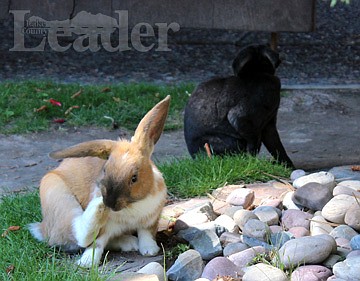Running wild
From the floppy ears right down to their fluffy little tails, its is hard to deny how cute bunnies are.
They may be cute and cuddly but domestic rabbits have the potential to cause irreparable damage to the ecosystem on Finley Point near Polson.
Known for its booming bunny population, the East Shore Smoke House on Highway 35 began cashing in on their presence when they took over the restaurant six years ago. Holly Glover said the bunnies bring people in from all over Western Montana. Known as the “bunny whisperer,” Glover can just clap her hands and several bunnies will come running, expecting their favorite treat: Sun Chips.
Last summer the restaurant started a free promotion for kids who visit the restaurant called the Smoke House Bunny Club. Members of the club get free ice cream with their meal and free “bunny snacks,” a cup full of chips and French fries to feed to gluttonous rabbits who reside in the tunnels underneath the restaurant’s deck.
Glover said that the staff feed the bunnies when temperatures drop and winter sets in. Along with lettuce and carrot trimmings, staff supplements the rabbits diet with pet store quality rabbit food. This isn’t the only protection the bunnies get. Glover said they also make sure nobody harasses the little hoppers and lets customers know not to let their dogs roam the open field next to the Smoke House.
So far the presence of the furry friends has been a highlight for the restaurant.
“They’ve never been a nuisance, never,” Glover said.
Smoke House owner Janice Bassett said their bunny population exploded several years ago.
“They just did what bunnies do,” Bassett said.
She said at the time she counted upwards of 75 rabbits near the restaurant and they began to give the bunnies away. To make matters worse, people began to drop unwanted pet rabbits off near the Smoke House. Fortunately, local predators soon discovered the plethora of bunnies, Bassett said, which is why she is not worried about the number of rabbits getting out of hand and becoming a problem.
A quarter-mile down the road, Kristy Grebetz agrees. As the general manager of Finley Point Grill, she said she has only seen rabbits near their restaurant twice in the past 10 years.
“It’s very odd that they do kind of cling to that place,” Grebetz said.
She said the pavement around the Finley Point Grill may be what keeps the rabbits away, and while they aren’t bothering either restaurant they could be bugging others.
“I’d imagine if you were a neighbor it could be annoying,” Grebetz said.
Though they are not a problem yet, the situation could change quickly. The population has varied each year due to harsh winters, but overall the population appears to be on the rise. Rabbits have been turning up farther down Finley Point Road, as far as two miles from the Smoke House.
While 95 percent of Finley Point is privately owned property, the entire area lies within the borders of the Flathead Indian Reservation. Regardless of ownership, it is the responsibility of the Confederated Salish and Kootenai Tribes (CSKT) to manage wildlife, Germaine White said.
“Turning domestic animals loose is never a good idea,” White said.
Tribal wildlife biologist, Whisper Camel-Means, agrees.
“Unintended consequences of feeding cute little bunnies are bigger than getting 50 bunnies the next year,” she said, adding that the number of predators in the area could increase and cause problems for neighbors with livestock.
Camel-Means said wildlife staff would most likely use live traps to remove rabbits if they start to cause trouble.
Janene Lichtenberg, a CSKT tribal mitigation biologist, said domestic feral rabbits have become a problem in the province of British Columbia to the north. The feral rabbits can also harm native rabbit species by introducing disease or parasites and competing for limited food sources.
Lichtenberg said there have been similar instances where domestic animals have been set out into the wild. On the lower Flathead River, a population of American bullfrogs that were set loose has begun preying upon native frog species. By the time the bullfrogs became a problem it was too late to relocate them.
“Often we don’t realize what the impacts could be until years later,” Lichtenberg said.
She said our area is lucky because we have not had too many exotic species coming into the area, adding the bullfrog population was the first time she has dealt with an issue of this nature. If the rabbits begin to spread, a management plan will be discussed, Lichtenberg said.
White, Camel-Means and Lichtenberg all said they were unaware of a problem with the bunnies. Residents are advised to contact CSKT Wildlife Management staff if they are having problems with rabbits on their property.
For now, the bunny population seems to be in control Bassett said, adding she was worried when they only counted 10 rabbits at the Smoke House. Bunny Club members shouldn’t worry, Bassett said, because they recently found a new batch of bunny babies assuring the rabbits will be sticking around.

